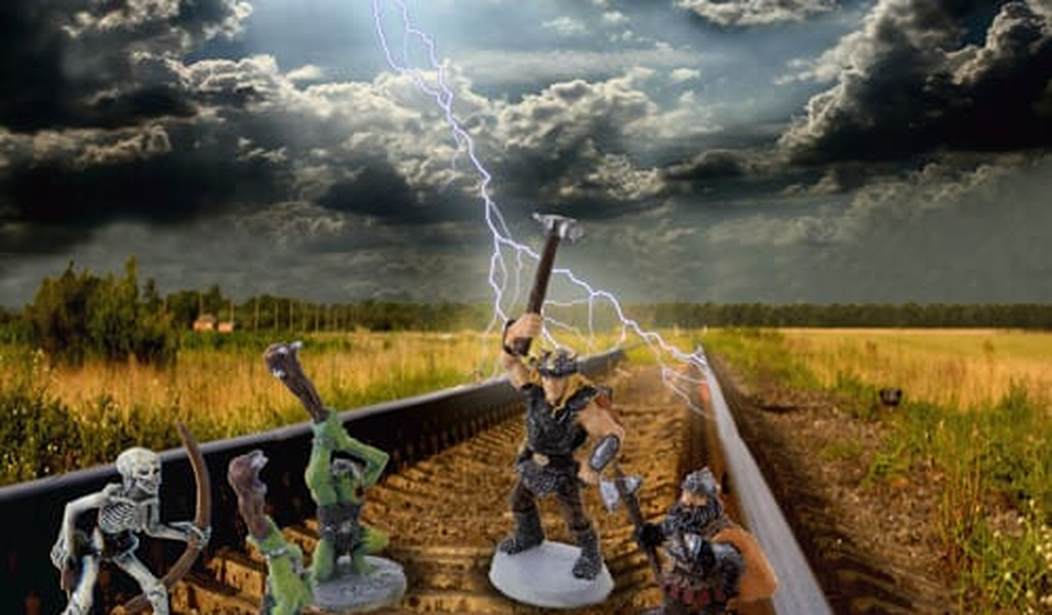One of the issues that can arise during even the most mature, civilized, and involved pencil-and-paper roleplaying game (RPG) campaign is the appearance of the dreaded Railroad. Put simply, “railroading” is when the gamemaster (GM) makes it clear that the Player-characters (PCs) will be going to be present at a specific activity, or visit a particular location, or watch as a certain event unfolds. This is usually modified with the phrase “whether they like it, or not” — except that it’s invariably true that the PCs will not like whatever’s about to happen. Very few gamers object to being told that nice things are going to happen to their characters, after all. They may not believe it, because gamers are usually healthily paranoid*, but they’ll not object.
So far, that seems horrid, yes? Except that there’s something called (among other things) the Plot Wagon, which is shorthand for “Well, we’re all here to have an adventure. Here is the one that the GM has created for us.” A gaming party has to go clean out some dungeon full of orcs; it might as well be the one that the GM has already mapped out and written up the flavor-text for (there’s also the classic “Bond heroes are ALWAYS captured and then given huge chunks of exposition by the villain” example, but virtually every gaming system out there that addresses the problem of player agency uses said example anyway). The difference between the two concepts was best described by my wife (who is herself a former GM) as this: a Plot Wagon has a beginning, and an end, but the players can make their own way there. But you get on the Railroad, and then you get off the Railroad, and that’s that.
In other words: the issue here is really player agency, and how casually it’s overruled by a GM. Most gaming groups will accept the idea that — provided that their precious stuff is not arbitrarily taken away permanently — every so often they will be, say, kidnapped and sold into slavery on a pirate galley. Or kidnapped and sentenced to slavery in the mines. Or kidnapped and forced into slavery in the arena… you get the drill. The event in question is usually understood to be the campaign fast-forwarding through the boring parts in order to get to the good bits (in this case, a good, old-fashioned Slave Revolt and possibly a new vehicle or two).
What players do not like is the suggestion that nothing that they say or do matters. That usually results in the non-player characters (NPCs) always spouting their lines no matter what the PCs do, the timeline of events never gets changed no matter how hard the PCs work to avert their fate, and the only result of a successful change in the situation is to make it worse, because now the GM is mad that he can’t use his maps. Or, to take the GM’s side: he’s just spent his precious free time writing up a campaign setting. He’d like to use it. He feels like the PCs are deliberately being jackasses about doing anything except play the campaign. And sometimes this is, in point of fact, true. So railroading the party can be an exquisite temptation… because why are they here, anyway?
Well, players — and gamemasters! — are there to have fun. A point that can often be overlooked in these kinds of discussions. Like most problems of this type, the usual advice (“better communication”) is both correct and absolutely useless; so I’ll offer some practical advice, instead. If there’s a railroading problem in your game, switch GMs for a month. That is: have one of the players GM, and have the GM game. That might give both sides of the issue a bit of needed perspective. Even if it doesn’t, the group will have at least have a month off from their usual group dynamic drama. Admittedly, you might be replacing it with a completely different group dynamic drama, but at least it’s novel, right?
*It’s not paranoia if there’s a rational reason to be suspicious and fearful that the universe is out to get you — or, rather, that your GM is out to make your character’s life far too interesting.










Join the conversation as a VIP Member